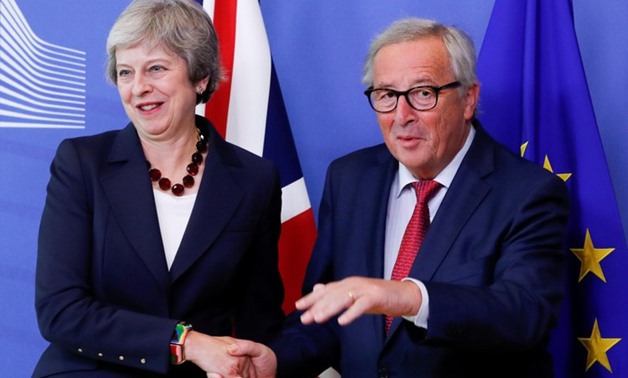
British Prime Minister Theresa May is welcomed by European Commission President Jean-Claude Juncker ahead of the European Union leaders summ - Reuters
BRUSSELS - 18 October 2018: British Prime Minister Theresa May offered no new ideas to break the deadlock in Brexit negotiations but assured fellow EU leaders at a summit in Brussels on Wednesday that she was working hard on a deal.
EU diplomats spoke of a much more positive mood, with May appearing to show greater understanding for some of the EU's concerns, including Ireland's need for an insurance clause to ensure its British land border could never be closed.
May was given a half-hour slot to speak to the bloc's other leaders before they sat down to dinner without her and discussed preparations for a possible no-deal Brexit under which Britain leaves the European Union without a treaty to cushion the disruption to businesses across the continent.
But three days after talks stalled over the Irish border "backstop", thwarting hopes of a deal at the summit, May arrived determined to stress that a deal was still on the cards.
"What we've seen is that we've solved most of the issues in the withdrawal agreement. There is still the question of the Northern Irish backstop," she told reporters on arrival.
"By working intensively and closely, we can achieve that deal," May added. "Now is the time to make it happen."
A month after May's last meeting in Austria, when her rejection of EU proposals designed to avoid a revival of border tensions in Northern Ireland provoked angry reactions, her tone was much calmer, said EU officials who were present.
"The tone was more relaxed than in Salzburg, undoubtedly. There is a message of goodwill," said Antonio Tajani, president of the European Parliament.
"But I did not perceive anything substantially new in terms of content," he said. "The tone was of someone who wants to reach an agreement."
An aide to French President Emmanuel Macron said May had shown she was open and interested in clinching a deal. Earlier, Macron said he wanted May to explain what kind of deal she could get through her government and parliament.
TRANSITION PROPOSAL
Tajani said he raised with May the possibility that the post-Brexit transition period, during which Britain would retain EU rules and avoid border problems with Ireland, could be extended by a year to 2021 -- something EU negotiators proposed to soften a demand for special rules for Northern Ireland.
Such an extension, keeping Britain under EU governance with no say in it, would be highly unpopular with hardline supporters of Brexit. Tajani said May told him she would consider it but gave no indication of whether she favoured such an extension.
May has repeatedly ruled out extending what she calls an implementation period, but at least one of her ministers has indicated he may support such a step.
One EU diplomat closely involved in the negotiations said May's intervention had revived spirits after the disappointments of the weekend: The atmosphere has improved. There is more trust and willingness to move forward together."
Austrian Chancellor Sebastian Kurz said the difficult final phase of the talks did not necessarily mean they would be unsuccessful.
"It is always the case in negotiations that they are tense and difficult and challenging at the end. That doesn't mean they will fail. No one wants these negotiations to fail, neither the EU nor Theresa May want a hard Brexit," Kurz said.
Earlier, German Chancellor Angela Merkel had cautioned that Europe must prepare for all outcomes: "That includes the possibility that Britain leaves the European Union without a deal."
May will rejoin her EU counterparts on Thursday as the focus shifts to a summit with Asian leaders, including China's Premier Li Keqiang and the prime ministers of Japan and Russia.


Comments
Leave a Comment